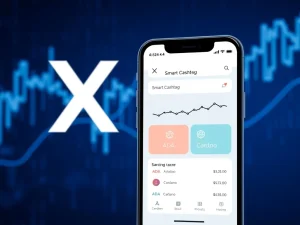Solana Gets Massive Boost: $100M Accelerator Launches in South Korea

[ad_1]
BitcoinWorld

Solana Gets Massive Boost: $100M Accelerator Launches in South Korea
Hey there, crypto enthusiasts and innovators! Get ready for some exciting news straight out of South Korea that could significantly impact the future of the Solana ecosystem, especially across Asia. We’re talking about a brand-new initiative that’s bringing serious funding and support to the forefront of Web3 development.
A Game Changer: The Solana Accelerator in South Korea
Breaking news from the heart of Asia! Astra Fintech and MixMarvel, two notable players in the blockchain space, have officially launched a major new program: the AMS accelerator. This isn’t just any accelerator; it’s specifically focused on bolstering the Solana (SOL) ecosystem and is strategically based in South Korea, a country known for its rapid tech adoption and vibrant gaming culture. According to an official announcement shared on X, this initiative is backed by Canada, adding an international dimension to its scope.
The core of the AMS accelerator is a substantial commitment: a dedicated fund totaling $100 million. This isn’t just pocket change; it’s a significant capital injection designed to fuel innovation and growth. The primary goals are clear:
To provide crucial support and resources to Korean Web3 developers.
To promote and build out PayFi infrastructure, likely bridging payments and decentralized finance.
To actively expand Solana’s presence and adoption throughout the broader Asian market.
This move signals a strong belief in Solana’s technology and its potential to become a dominant force in the Asian blockchain landscape, particularly within the Web3 and payments sectors.
Why Focus on South Korea for this Crypto Accelerator?
It’s a great question! Why choose South Korea as the home base for such a significant crypto accelerator aimed at expanding across Asia? The answer lies in South Korea’s unique position in the global tech and gaming industries, coupled with its growing interest in blockchain and Web3 technologies.
South Korea boasts a highly connected population, advanced digital infrastructure, and a massive, tech-savvy consumer base. It’s a global leader in online gaming, esports, and mobile technology adoption. This environment provides fertile ground for developing and testing new Web3 applications, especially those related to gaming, entertainment, and digital ownership (NFTs).
Furthermore, the country has shown increasing regulatory clarity and interest in fostering innovation in the blockchain space, albeit with careful consideration. Establishing an accelerator here allows Astra Fintech and MixMarvel to tap into a pool of highly skilled Web3 developers and innovative startups who understand the nuances of the Asian market.
Think of South Korea as a potential launchpad. Success here, particularly in integrating PayFi solutions and compelling Web3 experiences, could create a blueprint for wider adoption in other Asian countries. It’s a strategic move to leverage a dynamic local ecosystem for regional expansion.
Fueling Innovation: How Will the $100M Fund Support Web3 Developers?
The $100 million fund is the engine driving the AMS accelerator. Its primary purpose is to provide financial backing and resources directly to Web3 developers and startups building on the Solana blockchain. But how exactly will this fund be utilized?
Accelerator programs typically offer a combination of funding, mentorship, and resources. For developers accepted into the AMS program, this could translate to:
Seed or Early-Stage Funding: Providing the necessary capital for teams to build out their initial products and scale operations.
Technical Support: Offering expertise specific to the Solana blockchain, helping developers optimize their applications for performance and efficiency.
Mentorship: Connecting startups with experienced entrepreneurs, investors, and industry leaders in both traditional tech and the blockchain space.
Business Development: Assisting teams with go-to-market strategies, user acquisition, and forming key partnerships.
Networking Opportunities: Providing access to a broader ecosystem of investors, potential partners, and the wider Solana community.
The focus on Korean developers is key. This ensures that the projects supported are likely to be culturally relevant and tailored to the specific demands and trends of the South Korea market, which can then serve as a model for the rest of Asia blockchain adoption.
Beyond Development: PayFi and Asia Blockchain Expansion
The AMS accelerator’s vision extends beyond simply funding development. Two other critical components are promoting PayFi infrastructure and driving overall Asia blockchain expansion for Solana.
What is PayFi? While not a universally defined term, in this context, it likely refers to the intersection of payments and decentralized finance (DeFi). This could involve building applications that make it easier for users and businesses to use Solana for everyday transactions, integrate crypto payments into existing services, or develop innovative financial products leveraging Solana’s speed and low transaction costs. Think of solutions that bridge traditional payment systems with the efficiency of blockchain.
The push for PayFi infrastructure suggests a strategic effort to make Solana more accessible and useful for real-world economic activity, moving beyond just speculative trading or niche applications. Successful PayFi solutions could significantly increase user adoption and transaction volume on the network.
The goal of Asia blockchain expansion is ambitious. Asia represents a massive and diverse market with varying levels of blockchain adoption and regulation. By basing the accelerator in South Korea and focusing on locally relevant projects, Astra Fintech and MixMarvel aim to create success stories that can be replicated and scaled across the region. This involves:
Identifying and supporting projects with regional appeal.
Building partnerships with local businesses and communities in various Asian countries.
Navigating diverse regulatory landscapes across the continent.
Educating users and businesses about the benefits of Solana and Web3 technologies.
This holistic approach, combining developer support, specific infrastructure development (PayFi), and regional strategy, positions the AMS accelerator as a significant force for Solana’s growth in one of the world’s most important economic regions.
Who Are Astra Fintech and MixMarvel?
Understanding the entities behind this initiative provides valuable context. Astra Fintech is described as a Canada-backed entity, suggesting potential international investment and expertise. While specific details about Astra Fintech’s previous Web3 endeavors might require further research, their involvement signals significant capital and a strategic interest in the Asian market and the Solana ecosystem.
MixMarvel is a well-known blockchain gaming platform and ecosystem. They have a history of developing and publishing blockchain games and have been active in the Web3 space for some time. Their expertise in gaming and user-facing applications makes them a strong partner for an accelerator focused on bringing Web3 experiences to a broad audience, particularly in a gaming-centric market like South Korea.
The collaboration between a potentially investment-focused entity like Astra Fintech and an experienced Web3 platform like MixMarvel creates a powerful synergy, combining financial backing with practical industry knowledge.
Potential Benefits and Impact
This $100M crypto accelerator could have several positive impacts:
Boost Korean Web3 Ecosystem: Directly injecting funds and resources will help local startups grow and innovate.
Drive Solana Adoption: Successful projects emerging from the accelerator will bring new users and transaction volume to the Solana network.
Accelerate PayFi Development: Focused support can lead to the creation of practical, user-friendly payment and DeFi solutions on Solana.
Position Solana in Asia: Strengthen Solana’s competitive standing against other blockchains vying for dominance in the Asian market.
Attract Global Talent: The significant funding and strategic location could draw international developers and projects interested in the Asian market.
It’s a win-win scenario that leverages South Korea’s strengths to benefit the global Solana ecosystem and potentially drive significant innovation in the PayFi and Web3 sectors across Asia.
Challenges and Considerations
While the announcement is exciting, it’s also important to consider potential challenges:
Regulatory Environment: Navigating the evolving blockchain regulations in South Korea and across other Asian countries will be crucial.
Market Competition: The Asian market is highly competitive, with various blockchains and tech giants vying for attention.
Talent Acquisition: While South Korea has skilled developers, attracting the best Web3 talent to build on Solana specifically requires strong incentives.
Execution Risk: The success of the accelerator depends heavily on the quality of the projects selected and the effectiveness of the support provided.
PayFi Adoption Hurdles: Convincing mainstream users and businesses to adopt new crypto-based payment systems faces significant educational and logistical challenges.
Addressing these challenges will be key to realizing the full potential of the AMS accelerator.
What Does This Mean for Developers and the Solana Community?
For Web3 developers, particularly those in or targeting the South Korea and broader Asian markets, this presents a significant opportunity. If you’re building on Solana or considering it, this accelerator could be a potential source of funding, mentorship, and market access. Keep an eye on the AMS accelerator’s application process and focus areas.
For the wider Solana community, this is positive news. Increased developer activity, potential for innovative PayFi applications, and a strategic push into the Asian market can only strengthen the network’s position and drive future growth. It demonstrates continued investment and confidence in Solana’s scalability and potential.
In Conclusion: A Bold Step for Solana in Asia
The launch of the $100 million AMS accelerator by Astra Fintech and MixMarvel in South Korea is a bold and strategic move. It represents a significant investment in nurturing Web3 developers, building essential PayFi infrastructure, and accelerating Solana adoption across the crucial Asia blockchain landscape. By leveraging South Korea‘s dynamic tech scene, the accelerator aims to cultivate innovative projects that can thrive locally and scale regionally.
While challenges exist, the substantial funding and focused approach signal a strong commitment to making Solana a leading blockchain in Asia. This initiative has the potential to unlock new use cases, onboard millions of users, and significantly contribute to the growth and maturity of the global Web3 ecosystem.
To learn more about the latest explore our article on key developments shaping Solana Asia blockchain expansion.
This post Solana Gets Massive Boost: $100M Accelerator Launches in South Korea first appeared on BitcoinWorld and is written by Editorial Team
[ad_2]
Source link









